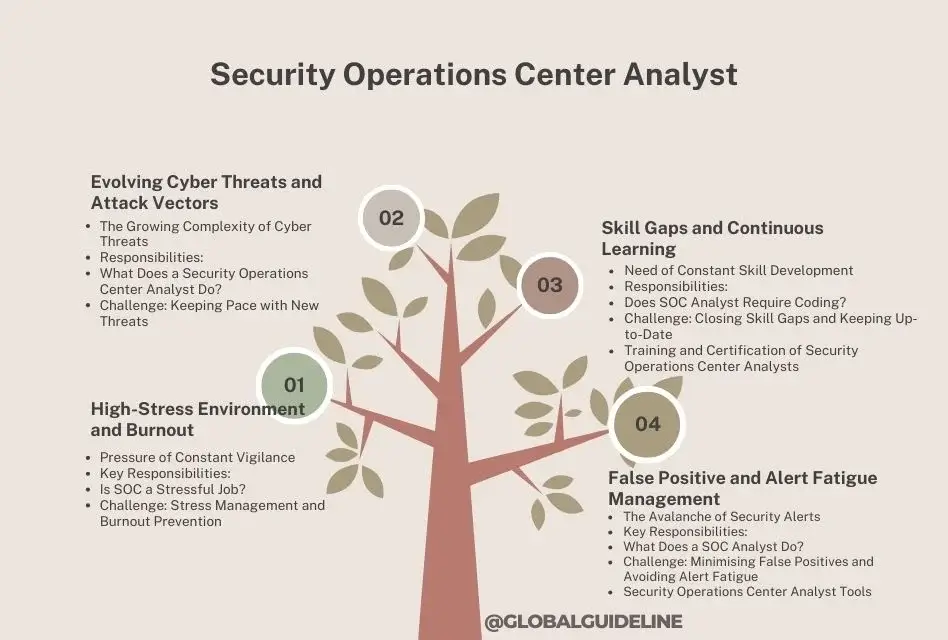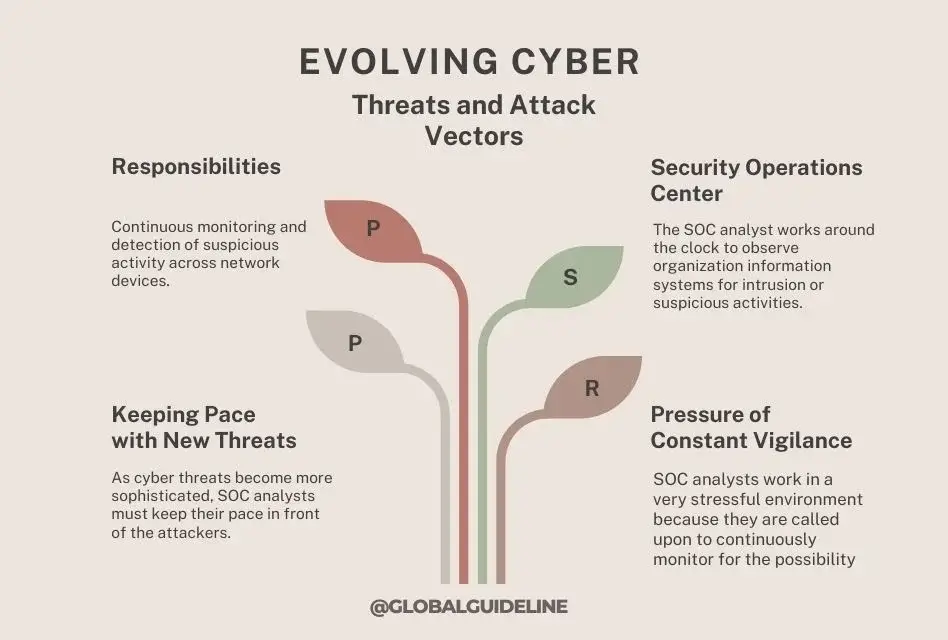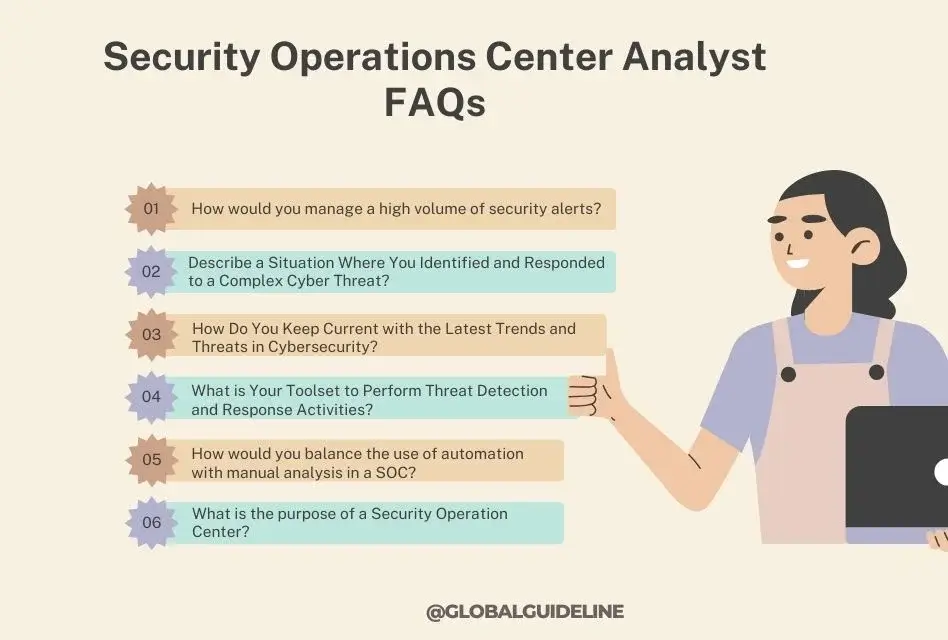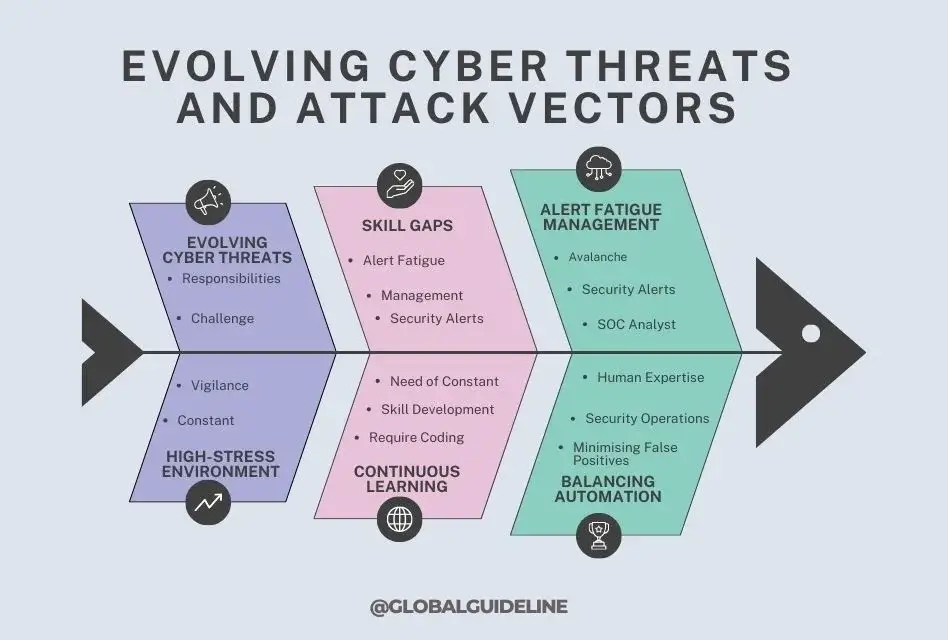With modern development in cybersecurity, a Security Operation Center Analyst is one of the most demanded and highly critical professions. The skilled SOC analysts are in demand due to the rising threats that organizations are getting from cybercriminals. The career, however, has many challenges. Five key challenges that any SOC analyst is likely to face in the near future are addressed within this article. We will also cover the role of a SOC analyst, the required skills, and how to overcome these challenges in order to have a successful career.
Table of Contents

1. Evolving Cyber Threats and Attack Vectors
The Growing Complexity of Cyber Threats
The cyber world is dynamic; it keeps on changing. Attackers continuously test defenses for a security breach using new advanced techniques. Keeping pace with such evolving cyber threats is one of the biggest challenges a SOC Analyst must face. Knowledge of current cyber threats, attack vectors, and types of malware needs to be continuously updated to detect incidents effectively and respond properly to those incidents.
Responsibilities:
- Continuous monitoring and detection of suspicious activity across network devices.
- Analyzing cyber threats, using threat intelligence to anticipate an attack potentially.
- Response to security incidents and mitigating risks.
What Does a Security Operations Center Analyst Do?
The SOC analyst works around the clock to observe organization information systems for intrusion or suspicious activities. This may include intrusion detection systems and security information and event management platforms for the detection of and responding to cyber threats.
Challenge: Keeping Pace with New Threats
As cyber threats become more sophisticated, SOC analysts must keep their pace in front of the attackers. In this regard, continuous learning, staying updated with the latest threat intelligence, and adapting to new security frameworks are crucial.
2. High-Stress Environment and Burnout
Pressure of Constant Vigilance
SOC analysts work in a very stressful environment because they are called upon to continuously monitor for the possibility of security incidents. The nature of the job requires them to be alert every time, as even a small oversight may create a huge security breach. This alone puts a lot of pressure, and this is why it can be considered one of the most painful tasks in the position.
Key Responsibilities:
- Manage and respond to security incidents in real-time.
- This would involve working for extended hours, including nights and weekends, to achieve this continuity.
- It would involve incident response coordination with the SOC team and other departments.
Is SOC a Stressful Job?
Yes, it is stressful to work as a SOC analyst because, really, much is at stake as far as preventing cyber-attacks is concerned, and the task calls for round-the-clock monitoring.
Challenge: Stress Management and Burnout Prevention
SOC analysts are supposed to manage their workload and take regular breaks to prevent themselves from getting burnt out. The team might be of help in this direction. Organizations too might help by providing resources for mental health and stress management.
3. Skill Gaps and Continuous Learning
Need of Constant Skill Development
As the cybersecurity world is obviously undergoing constant evolution, a SOC analyst must be ready to upgrade knowledge and abilities with each new development in technology and threat vectors. This would imply training for new tools, advanced analytics capabilities, and knowledge of the latest security frameworks. Due to the rapid evolution of cybersecurity, this is becoming increasingly challenging for the SOC analyst to stay relevant.
Responsibilities:
- Dedicated involvement in training and certification courses.
- Being updated on the most recent available safety means, tools, and technologies.
- Improvement in incident response and threat detection techniques on a continuous basis.
Does SOC Analyst Require Coding?
While coding is not always required, basic programming language knowledge in the form of Python or scripting languages can certainly help perform various automations and threat analysis.
Challenge: Closing Skill Gaps and Keeping Up-to-Date
Continuous learning and professional development by SOC analysts is critical. Courses, certification, and cybersecurity communities will help bridge the skill deficit.
Training and Certification of Security Operations Center Analysts
Other ways through which SOC analysts can make themselves competitive in the job market include getting certifications like Certified Information Systems Security Professional, Certified Ethical Hacker, and CompTIA Security+.
4. False Positive and Alert Fatigue Management
The Avalanche of Security Alerts
SOC analysts are generally presented with a plethora of security alerts; the greater part of these is false positives. This may often lead to alert fatigue, where analysts become numb to alerts and may miss actual threats. Carrying out an accurate identification of real threats within this avalanche of data is an uphill task.
Key Responsibilities:
- Monitoring and analyzing security alerts from different sources.
- Distinguish between false positives and real threats.
- Tune the security systems to reduce the instances of false positives.
What Does a SOC Analyst Do?
The work of the SOC analyst is to investigate the security alert and escalate incidents so that critical threats are dealt with in a timely manner. It involves analyzing massive volumes of data in order to find the real security incident.
Challenge: Minimising False Positives and Avoiding Alert Fatigue
This can help SOC analysts tame alert fatigue by optimizing security tools, setting threshold limits for alerts, and automating whatever can be done manually to reduce workload.
Security Operations Center Analyst Tools
A familiarity with SIEM systems, IDS/IPS, and threat intelligence platforms are all critical components for being effective in alert management and reducing the number of false positives.
5. Balancing Automation with Human Expertise
The Role of Automation in Cybersecurity
Automation is deployed in security operation centers to perform routine tasks, such as scanning for vulnerabilities or responding to low-level threats. Automation does introduce much more efficiency but at the same time presents a challenge in itself: finding the right balance between automatic workflows and human expertise. SOC analysts have to know precisely when to let automation take over and when to fall back on human judgment.
Key Responsibilities:
- Deploy and manage automated security tools.
- Automation frees up the resources of a SOC by automating mundane tasks and dedicating time to complex threat analysis.
- Further, ensuring a delicate balance whereby automated responses do not miss out on nuances of threats requiring human intervention.
Security Operations Center Framework
A good SOC framework should be one that integrates automation with human judgment so that the automated tools complement the jobs of SOC analysts without removing vital human oversight from the equation.
Challenge: Balancing Automation with Human Judgment
The SOC analyst should leverage this ability to automate for efficiency, retaining the human aspect of critical assessment and response towards more complex threats that require human decision-making ability.
Job Title: Security Operations Center Analyst
The general job description of a SOC analyst entails managing and working with automation tools, threat analysis, and information system security.

Security Operations Center Analyst Interview Questions
These are some of the questions one may expect to be asked when looking to apply for a Security Operations Center Analyst post. In this set of questions, the interviewer would look to assess your technical skills, problem-solving ability, and experience in handling cyber threats. Here are some commonly asked questions:
1. How would you manage a high volume of security alerts?
- Discuss how you triage or prioritize alerts, handle false positives, and prevent alert fatigue.
2. Describe a Situation Where You Identified and Responded to a Complex Cyber Threat?
- Give an example that focuses on your analysis skills and incident response experience.
3. What is Your Toolset to Perform Threat Detection and Response Activities?
- Enumerate the tools with which you are familiar, including but not limited to the following: SIEM systems, IDS/IPS, and threat intelligence platforms.
4. How Do You Keep Current with the Latest Trends and Threats in Cybersecurity?
- Mention any certifications, training, or resources used to stay updated in the skillset.
5. How would you balance the use of automation with manual analysis in a SOC?
- Describe how one would go about incorporating automation into one’s workflow while ensuring critical threats get human attention.
Is SOC Analyst a Good Career?
Indeed,SOC analyst can be a very rewarding career for those who are passionate about cybersecurity and ready and resilient in the face of continuous new challenges. In fact, a SOC analyst may have the right ingredient of skills and attitude to develop a successful and impacting career path in this line of work.
Frequently Asked Questions
Q1: What is a Security Operations Center Analyst?
A Security Operations Center Analyst is a professional who monitors, detects, and responds to cyber threats within the context of information systems.
Q2: What is a SOC Analyst?
A SOC analyst monitors network traffic, analyzes security alerts, investigates suspicious activities, and responds to security incidents in order to protect an organization’s data and systems.
Q3: How Stressful Is SOC Analyst Job?
Yes, it is a stressful job because the stakes are high: one has to prevent cyber attacks and be always on their toes.
Q4: Does SOC Analyst Require Coding?
While coding is not always required, some knowledge of programming languages will help in automating tasks and analyzing threats themselves.
Q5: How Much is SOC Analyst Salary?
The salaries of an SOC analyst in the USA start from $70,000 and go up to $110,000 per year. It varies greatly based on experience, location, and the kind of role they’re looking at.
Q6: How to Learn SOC Analyst Skills?
Learning of SOC analyst skills is done in a particular series: taking cybersecurity courses, followed by getting a certification and then getting practical experience through an internship or second-level entry job.
Q7: What is the purpose of a Security Operation Center?
The roles of a Security Operations Centre are to monitor organization networks and systems continuously, to detect and respond to information security incidents, and to protect them from cyber threats.
By understanding and overcoming such issues, the SOC analysts secure not just their organisations from cyber threats but will also be elated in a long-standing career in cybersecurity.

Conclusion: Avoiding the Pitfalls of a Security Operations Center Analyst
Working as an analyst in a Security Operations Center is an absolutely demanding yet rewarding job at the same time. The SOC analysts are the first line of defense for any organization against cyber threats. However, their work is full of many challenges that include ever-evolving threats and alert fatigue-all have to be addressed with great continuous learning, firm problem-solving skills, and a well-balanced approach toward automation.










